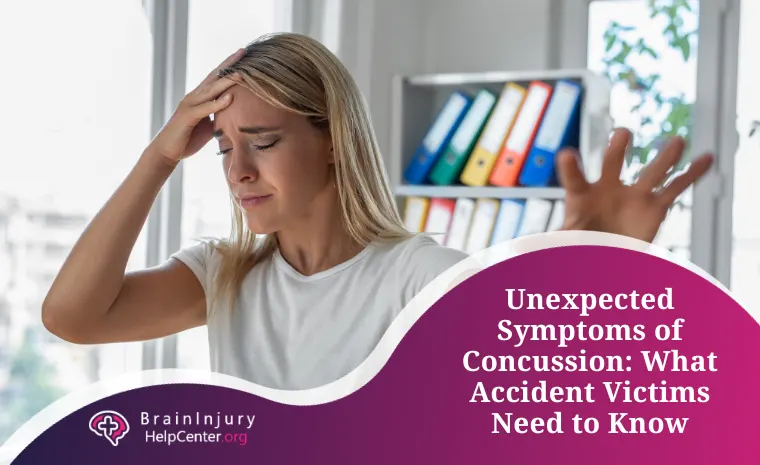Unexpected Symptoms of Concussion: What Accident Victims Need to Know
Concussions are often associated with obvious symptoms like headaches and dizziness, but there are unexpected symptoms that accident victims need to be aware of.
In this article, we will delve into the less talked about but equally important signs of a concussion. Understanding these unexpected symptoms of concussion is crucial for proper diagnosis and timely treatment.
Got hurt in an accident? You might be eligible for claims.
The Basics of a Concussion
Before we discuss the unexpected symptoms of concussions, let’s take a moment to understand what a concussion is. A concussion is a mild traumatic brain injury that can occur due to a blow or jolt to the head. It disrupts the normal functioning of the brain and can lead to a range of symptoms, both expected and unexpected.
When a concussion occurs, there are several changes and effects on brain tissue and cells, even though they may not be visible on brain scans like CT or MRI. Here’s what happens at the cellular level during a concussion:
- Neuronal Stretching and Shearing: The primary injury in a concussion is the rapid movement of the brain within the skull. When there’s a sudden impact or deceleration, the brain can twist or move forcefully, causing stretching and shearing of neuronal connections. This can disrupt normal communication between brain cells.
- Ionic Imbalance: The impact on the brain can disrupt the delicate balance of ions (sodium, potassium, calcium) that are crucial for neuronal function. This imbalance can lead to changes in the electrical activity of neurons, affecting their ability to transmit signals.
- Release of Neurotransmitters: Concussions can trigger the release of excessive neurotransmitters like glutamate. Elevated glutamate levels can overstimulate neurons, leading to an influx of calcium ions and potential cell damage.
- Axonal Injury: Axons are the long projections of neurons responsible for transmitting signals. During a concussion, axonal injury can occur, impairing the communication between brain regions. This disruption can lead to temporary or persistent cognitive deficits.
- Inflammatory Response: The brain may initiate an inflammatory response as a protective mechanism. Immune cells are activated, and inflammatory molecules are released. While this response is intended to repair damaged tissue, excessive inflammation can be detrimental and contribute to symptoms.
- Temporary Cell Dysfunction: Brain cells, including neurons and glial cells, may temporarily dysfunction following a concussion. This can affect neurotransmitter regulation, blood flow, and metabolic processes.
Mild versus Severe Concussions: What is the Difference?
A mild concussion, also known as a Grade 1 to 2 concussion, is the most common type of concussion. It typically occurs when there is a mild or moderate blow to the head, causing a temporary disruption in brain function. Mild concussions, also known as Grade 1 concussions, are typically caused by less severe impacts to the head. Common causes include:
- Sports Injuries: Mild concussions are frequently seen in contact sports like football, soccer, and hockey, where players may collide with each other or get hit by balls or equipment.
- Falls: Slips, trips, and falls, especially among children and the elderly, can result in mild concussions when the head makes contact with the ground or a hard surface.
- Accidental Bumps: Bumping the head against a low ceiling, a door frame, or a piece of furniture can lead to a mild concussion.
- Motor Vehicle Accidents: Even minor car accidents can cause mild concussions when the head jolts forward or sideways upon impact.
- Recreational Activities: Activities like cycling, skateboarding, or rollerblading without proper safety gear can result in mild concussions if there’s a fall or collision.
- Workplace Accidents: In certain occupations, such as construction or manufacturing, workers may experience mild concussions due to falls or being struck by objects.
A severe concussion, also known as a Grade 3 concussion, is a more serious form of head injury and involves more significant brain disruption. This involves more significant brain disruption and is usually caused by more forceful impacts. Common causes include:
- High-Speed Vehicle Accidents: Severe concussions often occur in high-speed car accidents, especially if there is a direct impact to the head or if the vehicle rolls over.
- Falls from Heights: Falls from significant heights, such as rooftops, ladders, or elevated platforms, can result in severe concussions due to the force of impact.
- Sports Collisions: In contact sports like American football, rugby, field or ice hockey, severe concussions can occur when players or athletic trainers collide at high speeds or experience heavy impacts.
- Combat and Explosions: Military personnel and individuals in combat zones are at risk of severe concussions from explosions and blasts.
- Industrial Accidents: In industrial settings, severe concussions can result from machinery accidents or being struck by heavy equipment.

What to Watch For: Unexpected and Typical Signs of Concussion
While symptoms of concussion can vary from person to person, there are several common concussion signs and symptoms to be aware of.
Unexpected Symptoms
- Post-Concussion Syndrome (PCS): PCS can manifest days or even weeks after the initial injury. It includes a combination of persistent symptoms such as headaches, dizziness, fatigue, and cognitive problems. Post-concussion syndrome can be long-lasting and require specialized treatment.
- Vision Problems: Delayed vision disturbances, including difficulty focusing, eye strain, double vision, blurry vision, or trouble tracking moving objects, can emerge days or weeks after a concussion.
- Seizures: While rare, some individuals may experience seizures as a delayed symptom of concussion. These seizures can occur weeks or months after the injury and should be addressed promptly by a medical professional.
- Vertigo and Loss of Balance: Delayed problems with balance and coordination may arise, making it challenging for individuals to engage in physical activities safely.
- Neurological Changes: In some cases, concussions can lead to delayed neurological changes, such as changes in taste or smell, numbness, tingling sensations in the limbs, or even loss of consciousness.
Typical Symptoms
- Persistent Headaches: Some individuals may experience chronic headaches that persist for weeks or months after the initial injury. These headaches can significantly impact daily life and may require ongoing management.
- Cognitive Impairments: While cognitive difficulties are common immediately after a concussion, some individuals may continue to experience memory loss, concentration, and decision-making long after the injury.
- Emotional Changes: Mood swings, anxiety, and depression can linger as long-term effects of a concussion. These emotional changes may require counseling or therapy to address.
- Sensory Sensitivities: Heightened sensitivity to light, noise, or certain smells can persist, making it challenging to engage in normal activities.
- Sleep Disorders: Some people develop long-term sleep disturbances, such as insomnia or sleep apnea, following a concussion. Sleep problems can exacerbate other symptoms and affect overall well-being.
The recovery process varies for each individual, and not everyone will experience long-term or delayed symptoms. However, recognizing the possibility of such symptoms is essential for individuals who have sustained a head injury and their healthcare providers.
If any of these symptoms arise or persist, seeking medical evaluation and appropriate treatment is advisable to ensure the best possible outcome and quality of life.
Coping with Unexpected Symptoms
If you or someone you know has experienced symptoms of concussion and is dealing with unexpected ones, it’s vital to take immediate action for a safe and effective recovery. Here’s what you should do:
- Rest: Rest is paramount during the early stages of recovery. Take plenty of rest as it helps the brain heal and reduces the risk of further complications. Avoid physical or mental exertion and get plenty of sleep.
- Gradual Return to Activities: Once your healthcare provider gives the green light, gradually reintroduce activities into your daily routine. Start with light, non-strenuous tasks and slowly increase your level of activity as you feel comfortable. Have someone to assist you, especially if you have persistent balance problems or blurred vision.
- Follow Medical Guidance: Strictly adhere to the guidance provided by your healthcare provider. This includes any restrictions on physical activity, screen time, and recommendations for managing symptoms.
- Avoid Alcohol and Drugs: Steer clear of alcohol and recreational drugs, as they can impede the healing process and exacerbate symptoms.
- Modify Your Environment: Make adjustments to your surroundings, such as reducing noise and minimizing exposure to bright lights, to accommodate sensory sensitivities.
- Communicate with Family and Friends: Inform your close contacts about your condition and any specific needs or limitations you have during your recovery. Their support can make a significant difference, especially those who had loss of memory.
- Regularly Check In with a Health Care Provider: Schedule follow-up appointments with your health care provider to track your progress and ensure you are on the right path to recovery. Also, seek emergency treatment if there is loss of consciousness or worsening symptoms.
Remember that every type of brain injury is unique, and recovery times vary. By taking these proactive steps and involving a healthcare provider, you can optimize your chances of a full and healthy recovery. Your well-being is a priority, and seeking professional guidance is a critical part of the healing journey.
Tips to Prevent Concussions
The CDC study highlighted how brain injury deaths vary by age group in terms of injury mechanisms.
- For children aged 0–4 years, TBI-related deaths are primarily linked to assault (42.9%) and motor vehicle traffic-related crashes (29.2%).
- In the 5–14 years age group, motor vehicle traffic crashes are the leading cause, accounting for the majority of TBI-related deaths (55.8%).
- Young adults aged 15–24 years also see motor vehicle traffic crashes as a significant factor, contributing to nearly half (47.4%) of TBI-related deaths.
- Among adults aged 65 years and older, falls are the predominant cause, accounting for the majority (54.4%) of TBI-related deaths.
Overall, among other factors, auto accidents accounted for the highest cases that resulted in brain injury resulting in death.
Preventing concussions in auto accidents requires a combination of responsible driving practices and using appropriate safety measures. Here are some steps to help reduce the risk of concussions in auto accidents:
- Wear Seat belts: Always wear your seat belt, and ensure that all passengers in the vehicle do the same. Seatbelts are crucial in preventing head injuries and concussions during accidents.
- Use Child Safety Seats: For young children, use appropriate child safety seats that are installed correctly in the vehicle. These seats are designed to protect them from head injuries in accidents.
- Drive Responsibly: Follow traffic laws and drive at safe speeds. Avoid aggressive driving behaviors, such as speeding and tailgating, which can lead to severe accidents.
- Avoid Distractions: Avoid using your phone or engaging in other distracting activities while driving. Distracted driving significantly increases the risk of accidents.
- Stay Sober: Never drive under the influence of alcohol or drugs. Impaired driving is a leading cause of accidents and can result in severe head injuries.
- Use Helmets on Motorcycles: If you ride a motorcycle, always wear a DOT-approved helmet. Helmets are effective in preventing head injuries, including concussions, in motorcycle accidents.
- Adjust Headrests: Ensure that the headrests in your vehicle are adjusted correctly. Properly positioned headrests can help minimize the risk of head and neck injuries in rear-end collisions.
- Follow Child Passenger Safety Guidelines: When transporting children, follow child passenger safety guidelines, including using rear-facing car seats for infants and toddlers and transitioning to booster seats and eventually seatbelts as they grow.
- Be Cautious in Adverse Conditions: Exercise extra caution when a concussed person is driving in adverse weather conditions, such as rain, snow, or ice. Reduced visibility and slippery roads increase the risk of accidents.
- Take Breaks on Long Trips: On long road trips, take regular breaks to combat driver fatigue. Fatigued driving can impair your judgment and reaction time.
While it’s not always possible to prevent every auto accident, these proactive measures can significantly reduce the risk of concussions and other head injuries in the event of a collision. Safe driving practices and adherence to safety guidelines are essential for protecting yourself and your passengers on the road.
Frequently Asked Questions
Are all concussions the same?
No, brain injuries can vary in severity, and signs of concussion may differ from person to person.
How long does it take to recover from a concussion with unexpected symptoms?
Recovery time varies, but it can take weeks to months, depending on the individual and the extent of the injury.
Can children experience unexpected concussion symptoms too?
Yes, children are also susceptible to these symptoms, and it’s essential to monitor them closely after head injuries.
What treatments are available for unexpected concussion symptoms?
Treatment options may include rest, cognitive therapy, physical therapy, and medication to manage specific symptoms.
Is it safe to return to physical activities after a concussion with unexpected symptoms?
It’s crucial to consult with a healthcare professional before resuming physical activities to avoid further injury.
Consult for Better Prognosis
Concussions are complex injuries that can manifest in various ways. While headaches and dizziness are well-known symptoms, the unexpected symptoms of concussions we’ve discussed can be equally debilitating. Accident victims need to be aware of these less-talked-about signs to ensure they receive the care and support they need for a full recovery.
The Brain Injury Help Center offers support, legal advice, and valuable health information for individuals affected by brain injuries. We are a dedicated center committed to empowering victims to reclaim their independence and functionality. Our team will tirelessly advocate for your rights, allowing you to focus solely on your recovery.If you or a loved one is grappling with a traumatic brain injury resulting from an accident due to someone else’s negligence, reach out to us at (866) 576-0936 for a free consultation.









